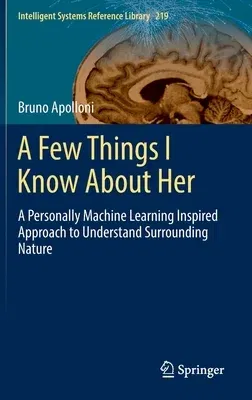Bruno Apolloni
(Author)A Few Things I Know about Her: A Personally Machine Learning Inspired Approach to Understand Surrounding Nature (2022)Hardcover - 2022, 2 April 2022

Qty
1
Turbo
Ships in 2 - 3 days
In Stock
Free Delivery
Cash on Delivery
15 Days
Free Returns
Secure Checkout

Part of Series
Intelligent Systems Reference Library
Print Length
198 pages
Language
English
Publisher
Springer
Date Published
2 Apr 2022
ISBN-10
303094378X
ISBN-13
9783030943783
Description
Product Details
Author:
Book Edition:
2022
Book Format:
Hardcover
Country of Origin:
NL
Date Published:
2 April 2022
Dimensions:
23.39 x
15.6 x
1.42 cm
ISBN-10:
303094378X
ISBN-13:
9783030943783
Language:
English
Location:
Cham
Pages:
198
Publisher:
Weight:
480.81 gm